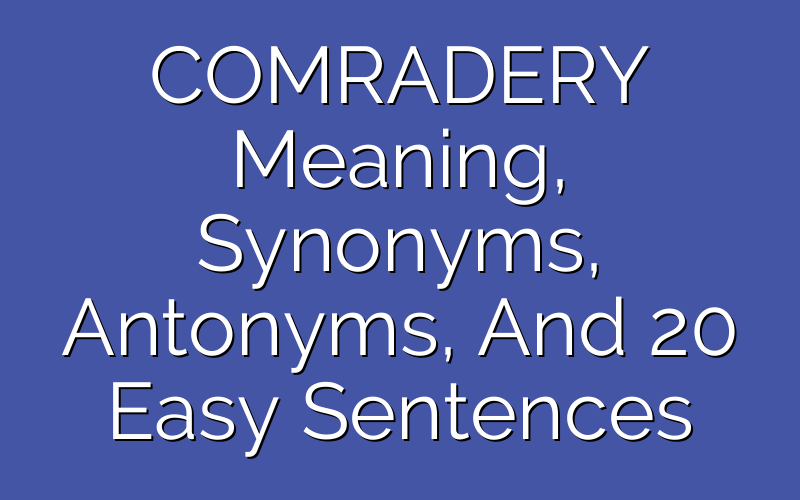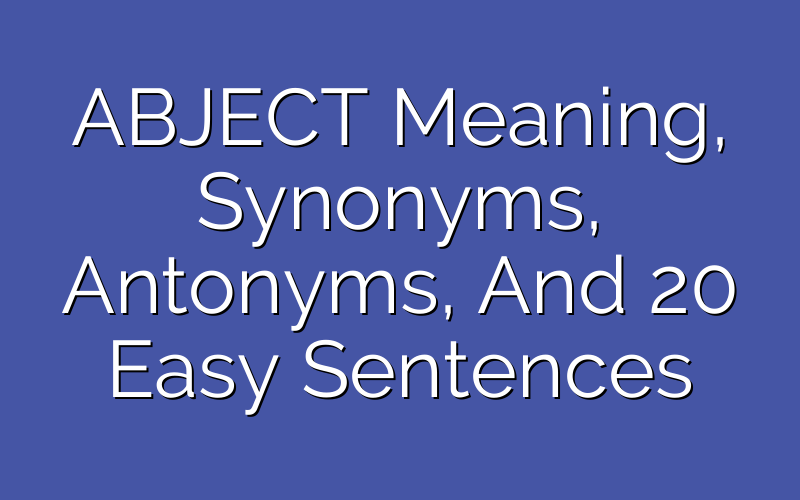The word “desperate” is often used to describe a situation where a person or group of people are in extreme need or are willing to take drastic measures to achieve a goal. In this article, we will explore the desperate meaning, desperate synonyms & antonyms with some example sentences to better understand their usage.
Desperate Meaning in English
The word desperate is an adjective used to describe a situation or person who is in urgent need or is willing to take extreme measures to achieve a goal. It can also refer to a situation that is difficult or hopeless, or to a person who is driven by a strong emotion, such as fear or desire.
Desperate Synonyms
There are several synonyms for desperate, each with its own connotations and shades of meaning.
Here are some common synonyms of desperate:
- Dire: Extremely serious or urgent, hopeless.
- Urgent: Requiring immediate action or attention, pressing.
- Critical: Extremely important, crucial, vital.
- Drastic: Extreme, severe, radical.
- Grave: Serious, solemn, somber.
- Agonizing: Intensely painful or distressing, unbearable.
- Anguished: Suffering from severe emotional pain or distress, tormented.
- Frenzied: Wildly excited or uncontrolled, frantic.
- Hysterical: Overwhelmed with emotion, particularly fear or anxiety.
- Imploring: Pleading, begging urgently.
Desperate Antonyms
Antonyms are words that are opposite in meaning to a given word. The antonyms for desperate include words that indicate a lack of urgency or need.
Here are some common antonyms of desperate:
- Calm: Peaceful, composed, relaxed.
- Content: Satisfied, fulfilled, contented.
- Confident: Self-assured, sure of oneself, poised.
- Comfortable: At ease, relaxed, and contented.
- Hopeful: Optimistic, positive, confident.
10 Examples Of Desperate In A Sentences
Here are ten example sentences that use the word desperate to better understand its meaning:
- The family was desperate for food and shelter after the hurricane destroyed their home.
- She was so desperate to win the competition that she spent hours practicing every day.
- The corporation was in a desperate financial situation and had to lay off several employees.
- He was in such a desperate state that he turned to alcohol to cope with his problems.
- The refugees were in a desperate situation and needed help immediately.
- The doctor’s desperate efforts to save the patient’s life were unsuccessful.
- The team was in a desperate situation, down by 10 points with only a minute left in the game.
- The country was in a desperate state of poverty and needed foreign aid to survive.
- The teenager was so desperate for attention that she began to act out in class.
- The rescue team made a desperate attempt to save the trapped miners, but it was too late.
Let’s learn more about these meanings:
- Despite Meaning, Definition & Synonyms
- Abdication Meaning, Definition & Synonyms
- Playful Meaning & Example Sentences
- Abandoned Meaning, Definition & Synonyms
FAQ Related to the word Desperate
What is the Desperate Meaning?
The word desperate is often used to describe a situation that is urgent or critical. It can also refer to a person who is in a state of despair or hopelessness. When we say someone is desperate, we mean that they are willing to take extreme measures to achieve their goals or alleviate their suffering.
In some contexts, “desperate” can also be used to describe something that is reckless or foolish. For example, we might say that someone is making a desperate attempt to win back their ex, even though it’s clear that they’re not interested.
How is Desperate Used in Everyday Language?
Desperation is a common human experience, and as such, the word “desperate” is used frequently in everyday language. Here are some examples of how it might be used:
- “I’m desperate for a cup of coffee right now.” (expressing urgency or need)
- “He’s desperate for attention.” (describing a person’s emotional state)
- “She made a desperate attempt to save the relationship.” (describing an action taken out of desperation)
Can Desperate Have Positive Connotations?
While desperate is often used to describe negative situations or emotions, it can also have positive connotations. For example, someone might be described as “desperately in love” with their partner, which implies a strong emotional connection and a willingness to go to great lengths to maintain it.
Similarly, we might describe someone as “desperately committed” to a cause or project, which suggests a deep sense of dedication and passion.
How Can You Use Desperate in Writing?
Desperation can be a powerful tool in writing, as it evokes strong emotions and can create tension and conflict in a story. Here are some ways you might use the word “desperate” in your writing:
- Describing a character’s emotional state: “She felt desperate and alone, with no one to turn to.”
- Creating urgency in a plot: “The hero knew he had to act fast, or the situation would become desperate.”
- Developing conflict between characters: “The two rivals were locked in a desperate struggle for power.”
Have a look at Dictionary Browser in Tumblr.
Conclusion:
In conclusion, desperate is an adjective used to describe a situation or person who is in urgent need or is willing to take extreme measures to achieve a goal. Its synonyms and antonyms help us better understand the nuances of language and how to use words effectively in communication. When we use “desperate” to describe something, we indicate that the situation is dire or urgent, and that action must be taken quickly to address it.
Thank you for taking the time to read this article on the desperate synonyms, antonyms, meanings, and example sentences in English. If you found this information useful, we encourage you to share this post with your friends and colleagues on social media or by email. By doing so, you can help others expand their vocabulary and improve their writing skills. Sharing is caring!





